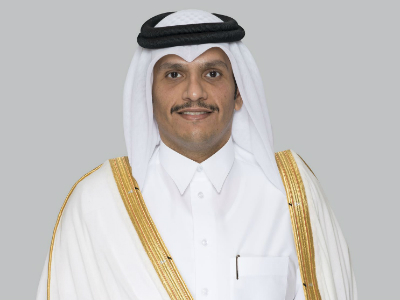The Foreign Minister Stresses Qatar's Commitment to Resolving GCC Crisis

Doha / Information Office / November 18
HE Deputy Prime Minister and Foreign Minister Sheikh Mohammed bin Abdulrahman Al-Thani stressed Saturday that the State of Qatar is still committed to resolving the GCC crisis. His Excellency noted that this commitment is a result of Qatar's belief that there is a bigger threat in the region, which is terrorism.
In an interview held with U.S. TV network MSNBC, HE Sheikh Mohammed bin Abdulrahman Al-Thani described the propaganda waged against the State of Qatar accusing it of terrorism without any evidence was baseless.
His Excellency stressed that the State of Qatar was a leader in countering terrorism and extremism, highlighting that the country hosts the central command for the global coalition. His Excellency then noted that Qatar is a frontrunner in combatting extremist ideologies when it establishes schools and provides high-quality education to vulnerable societies and poor countries abroad, pointing out that Qatar provides education to seven million children in East Asia and Central Asia.
On the strength of bilateral ties between the U.S. and the State of Qatar, HE the Foreign Minister said that the State of Qatar has always been a strong partner and ally to the United States in its fight against terror. This is evident by the fact that Qatar hosts between 11000 and 12000 American troops in Al Udeid Airbase, through which the United States carries out its missions against ISIS. His Excellency added that the U.S. has always expressed its appreciation for that partnership. Qatar also highly appreciates the partnership and is working with the U.S. on developing cooperation further.
HE the Foreign Minister addressed the position of the U.S. from the siege of Qatar and said that Qatar was getting support from the U.S. across the board for putting an end to the siege, whether it was U.S. President Donald Trump or members of his administration such U.S. Secretary of State Rex Tillerson and Secretary of Defense James Mattis among others. As to why the siege remains ongoing, His Excellency said it was a result of the actions of Saudi Arabia and the UAE towards Qatar and the illegal measures they took against the country by shutting borders and separating families, in addition to creating an anti-Qatar propaganda campaign. His Excellency stressed however that the State of Qatar was committed to reaching a resolution, because the country realizes that terrorism is a bigger threat facing the region.
On ties between the State of Qatar and Iran, HE the Foreign Minister noted that Qatar has a unique relationship with Iran. His Excellency pointed out that the State of Qatar is located between and shares borders with two big countries in Saudi Arabia and Iran. His Excellency noted however that there were concerns of Iran's increasing influence in the region, but stressed that those fears must be addressed peacefully and that is what the State of Qatar is encouraging other Gulf states to do. His Excellency added that this was also the decision taken during the GCC summit that took place in 2016, saying that the decision taken in December 2016 was to engage in dialogue with Iran on the principle that the GCC will be one entity and Iran the other.
Addressing whether there was a sense that Saudi Crown Prince Mohammed bin Salman was a threat to Qatar's Future, HE Sheikh Mohammed bin Abdulrahman Al-Thani said that there was a diversion in the policy of Saudi Arabia and the UAE from the GCC agreement which was the engagement in dialogue. There was also a sense of unpredictability when it comes to the policies of Saudi Arabia and UAE in the region, His Excellency said.
HE the Foreign Minister added that there was a lot of chaos and crises that occurred in the region, pointing out that Qatar was part of a bigger strategy now seen in Lebanon too.

